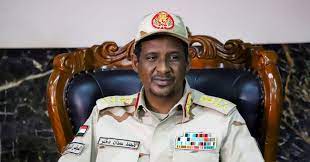

The Sudan’s paramilitary Rapid Support Forces (RSF), says it is open to an immediate, unconditional ceasefire through dialogue with the Sudanese army. This announcement follows the signing of an agreement known as the “Addis Ababa Declaration” between the RSF and the Coordination of Civil Democratic Forces (Taqaddum).
Under the terms of the agreement, signed on Tuesday, the RSF leader Mohamed Hamdan Daglo, and former Prime Minister and Chairman of Taqaddum, Abdallah Hamdok, jointly outlined a strategic roadmap aimed at ending hostilities and restoring stability in Sudan.
The “Addis Ababa Declaration” emphasizes key measures, including the release of over 450 detainees under the supervision of the International Committee of the Red Cross (ICRC), the establishment of safe corridors to facilitate humanitarian access, and the creation of a National Committee for the Protection of Civilians that will reinforce the commitment to safeguard the rights and well-being of civilians.
The RSF noted that it is committed to an immediate and unconditional cessation of hostilities through direct negotiations with the Sudanese army.
Taqaddum will engage in efforts to bring the army into alignment with the outlined procedure to pave the way for a complete cessation of hostilities agreement that is binding on both parties.
The military-led government in Port Sudan has yet to react to the declaration. However, its implementation is contingent on the signing of a cessation of hostilities agreement, a condition set forth by the Sudanese army commander, who insists on the withdrawal of RSF elements from urban areas before such an agreement can be finalized.
The Addis Ababa Declaration, intended as the foundation for further negotiations and a political settlement, represents a breakthrough in Sudan’s ongoing conflict that provides an opportunity for pro-democracy groups to actively participate in the peace and reconciliation process.
more recommended stories
 Somaliland’s Berbera Industrial Park: A New Era of Investment and Job Creation
Somaliland’s Berbera Industrial Park: A New Era of Investment and Job CreationThe Government of Somaliland, under the.
 President Irro’s Landmark Visit to UAE: A Diplomatic and Economic Win for Somaliland. Dubai, UAE – Somaliland’s Diplomatic Breakthrough
President Irro’s Landmark Visit to UAE: A Diplomatic and Economic Win for Somaliland. Dubai, UAE – Somaliland’s Diplomatic BreakthroughBy: Abdi Jama President Dr. Abdirahman.
 Kenya’s Unjustifiable Interference in Sudan: A Grave Violation of International Law and Regional Stability
Kenya’s Unjustifiable Interference in Sudan: A Grave Violation of International Law and Regional StabilityBy: Abdi Jama Kenya’s continued meddling.
 𝗙𝗼𝗿𝗺𝗲𝗿 𝗣𝗿𝗲𝘀𝗶𝗱𝗲𝗻𝘁 𝗠𝘂𝘀𝗲 𝗕𝗶𝗵𝗶’𝘀 𝗥𝗲𝗰𝗸𝗹𝗲𝘀𝘀 𝗔𝗰𝘁𝗶𝗼𝗻𝘀 𝗠𝘂𝘀𝘁 𝗡𝗼𝘁 𝗕𝗲 𝗜𝗴𝗻𝗼𝗿𝗲𝗱 – Abdihalim Musa
𝗙𝗼𝗿𝗺𝗲𝗿 𝗣𝗿𝗲𝘀𝗶𝗱𝗲𝗻𝘁 𝗠𝘂𝘀𝗲 𝗕𝗶𝗵𝗶’𝘀 𝗥𝗲𝗰𝗸𝗹𝗲𝘀𝘀 𝗔𝗰𝘁𝗶𝗼𝗻𝘀 𝗠𝘂𝘀𝘁 𝗡𝗼𝘁 𝗕𝗲 𝗜𝗴𝗻𝗼𝗿𝗲𝗱 – Abdihalim MusaYesterday, Somaliland witnessed a deeply troubling.

